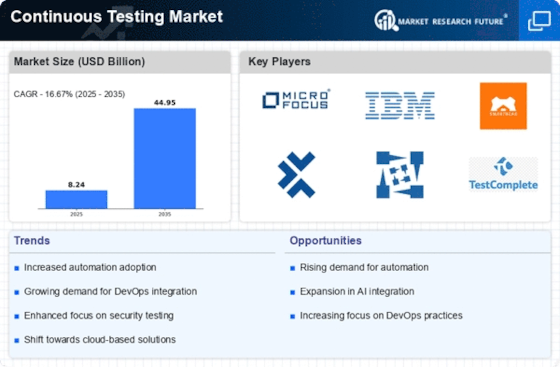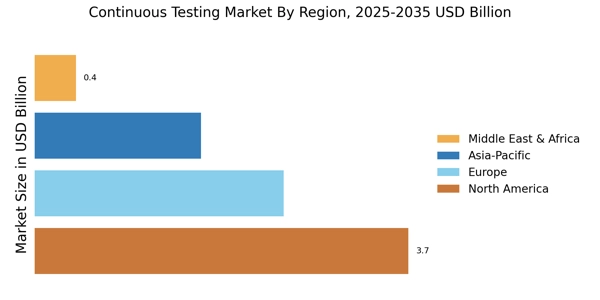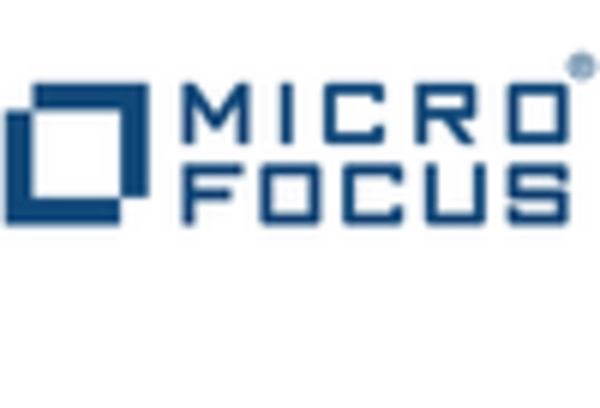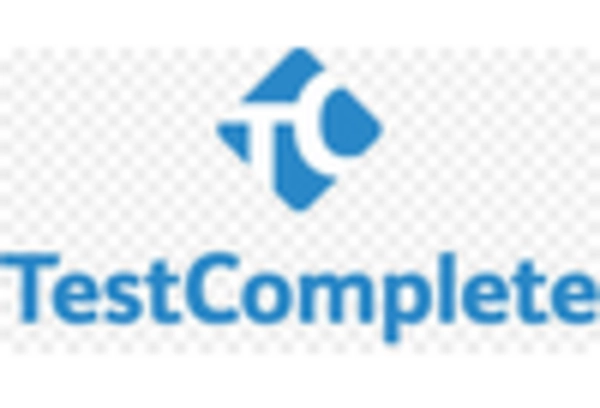Emphasis on Quality Assurance
The Continuous Testing Market is significantly influenced by the heightened emphasis on quality assurance in software development. Organizations are increasingly recognizing that delivering high-quality software is essential for customer satisfaction and retention. Recent statistics indicate that companies with robust quality assurance practices experience up to 30% fewer defects in production. This realization drives the adoption of continuous testing methodologies, as they facilitate early detection of defects and ensure that quality is maintained throughout the development lifecycle. As businesses strive to enhance their quality assurance processes, the continuous testing market is expected to expand, providing tools and frameworks that support rigorous testing standards.
Integration of Cloud Technologies
The integration of cloud technologies is reshaping the Continuous Testing Market. As organizations migrate to cloud-based environments, the need for continuous testing becomes more pronounced. Cloud platforms offer scalability and flexibility, which are essential for continuous testing practices. Data indicates that nearly 50% of enterprises are utilizing cloud services for their testing needs, highlighting a shift towards cloud-based continuous testing solutions. This trend suggests that as more organizations adopt cloud technologies, the demand for continuous testing tools that are compatible with cloud environments will likely increase, further propelling the growth of the Continuous Testing Market.
Regulatory Compliance Requirements
Regulatory compliance is becoming a critical driver for the Continuous Testing Market. As industries face stringent regulations regarding software quality and security, organizations are compelled to implement continuous testing to ensure compliance. For instance, sectors such as finance and healthcare are subject to rigorous standards that necessitate thorough testing processes. Data shows that compliance-related issues can lead to significant financial penalties, prompting organizations to prioritize continuous testing as a means of mitigating risks. This focus on regulatory compliance is likely to drive the adoption of continuous testing solutions, as businesses seek to align their testing practices with industry standards and regulations.
Rising Demand for Agile Development
The Continuous Testing Market is experiencing a notable surge in demand due to the increasing adoption of agile development methodologies. Organizations are shifting towards agile frameworks to enhance their software development processes, which necessitates continuous testing to ensure quality and speed. According to recent data, approximately 70% of software development teams are now employing agile practices, which inherently require a robust continuous testing strategy. This trend indicates that as more companies embrace agile, the need for continuous testing solutions will likely escalate, driving growth in the Continuous Testing Market. Furthermore, agile development promotes iterative testing, which aligns perfectly with continuous testing principles, thereby reinforcing the industry's expansion.
Growing Complexity of Software Applications
As software applications become increasingly complex, the Continuous Testing Market is poised for growth. Modern applications often integrate various technologies, platforms, and services, which complicates the testing process. This complexity necessitates continuous testing to identify and resolve issues early in the development cycle. Data suggests that over 60% of organizations report challenges in managing software complexity, which directly impacts their testing strategies. Continuous testing provides a solution by enabling teams to automate tests and ensure comprehensive coverage across diverse application components. Consequently, the demand for continuous testing tools and services is likely to rise, as organizations seek to maintain quality amidst growing software intricacies.

















